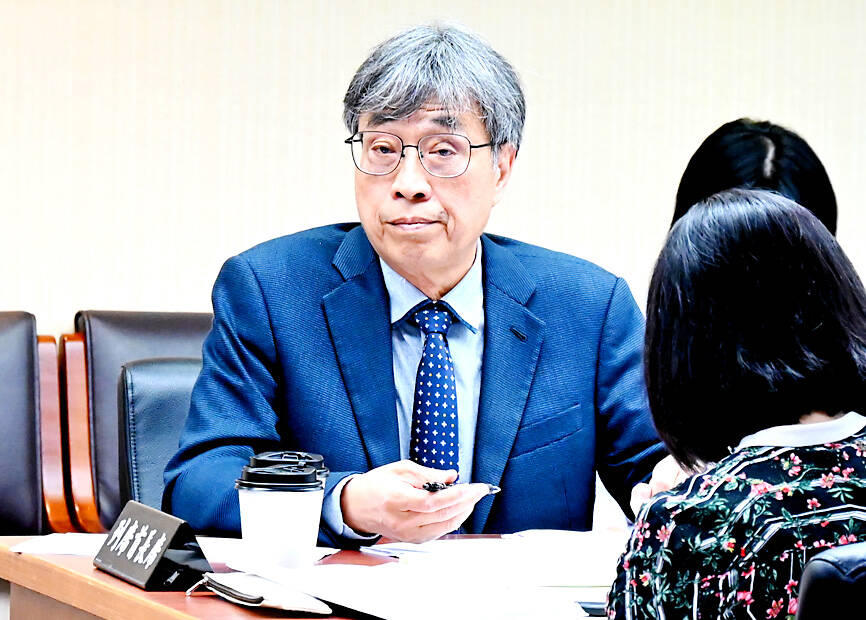The Ministry of Agriculture is launching a series of measures to boost the demand for Taiwan-
produced fresh milk to minimize the impact of the removal of tariffs on dairy products imported from New Zealand from 2025.
The zero-tariff policy for dairy products imported from New Zealand is part of an economic cooperation agreement between Taiwan and New Zealand, called ANZTEC, which was signed on July 10, 2013.

Photo: Chu Pei-hsiung, Taipei Times
At a joint meeting of four legislative committees yesterday, Chinese Nationalist Party (KMT) Legislator Lee De-wei (李德維) asked Acting Minister of Agriculture Chen Junne-jih (陳駿季) how the policy would affect the domestic fresh milk market.
“We have been holding talks with dairy farming industry representatives in the past year... The most important thing is to increase the demand for Taiwan-produced milk and distinguish it from milk imported from other countries,” Chen said.
The agricultural industry is redesigning the label for Taiwan-produced fresh milk and has developed the technology to identify any mixture of domestically produced milk and imported milk, he said.
Lee said the ministry should consider not calling imported liquid milk “fresh milk” to distinguish it from locally produced milk.
Chen said that the quality of Taiwan-produced fresh milk, as well as its low-carbon emission production process, should be recognized and affirmed by domestic consumers, which is a better way to distinguish between these two types of milk.
Chen told a meeting of the Economics Committee on Wednesday last week that the ministry is seeking approval from the Executive Yuan for a proposal to establish a four-year dairy farming industry development fund to mitigate the impact that the new policy might have on the domestic dairy farming industry.
The funding would be used to upgrade the local dairy farming industry, create demand for domestically produced dairy products and facilitate sales of these products, he said.
“We need to review the size of dairy cattle. Of the roughly 125,000 dairy cows in the country, 12,000 sick and weak ones are to be retired,” he said.
“We will seek to reduce the costs that dairy farmers spend to buy forage grass and incorporate the weather forecast system into the grass-drying process,” he said.
“We will also monitor the quality of domestically produced milk, coordinate the pricing scheme between ranches and dairy plants, reduce carbon emissions during the production process and facilitate the sales of domestically produced milk,” he added.
To boost demand for Taiwan-made dairy products, the government would increase the supply of fresh milk to school-age children and elderly people in farming and fishing villages, Chen said.
There would also be a traceability system for Taiwan-made dairy products, it said.
Some dairy farmers have suggested that the ministry intervene and help lower shelf placement fees for domestically produced dairy products in supermarkets or larger retail chains, as the fees generally account for 30 to 50 percent of retail prices.
“Pricing strategies for dairy products are determined based on various contracts between dairy plants and supermarkets, and it would be difficult for the government to intervene,” Chen said.

A strong continental cold air mass is to bring pollutants to Taiwan from tomorrow, the Ministry of Environment said today, as it issued an “orange” air quality alert for most of the country. All of Taiwan except for Hualien and Taitung counties is to be under an “orange” air quality alert tomorrow, indicating air quality that is unhealthy for sensitive groups. In China, areas from Shandong to Shanghai have been enveloped in haze since Saturday, the ministry said in a news release. Yesterday, hourly concentrations of PM2.5 in these areas ranged from 65 to 160 micrograms per cubic meter (mg/m³), and pollutants were

Taiwan’s armed forces have established response protocols for a wide range of sudden contingencies, including the “Wan Chun Plan” to protect the head of state, the Ministry of Defense (MND) said today. After US President Donald Trump on Saturday launched a series of airstrikes in Venezuela and kidnapped Venezuelan President Nicolas Maduro, concerns have been raised as to whether China would launch a similar “decapitation strike” on Taiwan. The armed forces regularly coordinate with relevant agencies and practice drills to ensure preparedness for a wide range of scenarios, Vice Minister of National Defense Hsu Szu-chien (徐斯儉) told reporters before a

EVA Airways on Saturday said that it had suspended a pilot and opened an investigation after he allegedly lost his temper and punched the first officer several times as their plane was taxiing before takeoff at Los Angeles International Airport. According to a report published on Thursday by The Reporter, the incident occurred after the flight’s Malaysian first officer tried to warn the Taiwanese pilot, surnamed Wen (文), that he was taxiing faster than the speed limit of 30 knots (55.6kph). After alerting the pilot several times without response, the first officer manually applied the brakes in accordance with standard operating

NOT AN OPENING: Trump’s violation of international law does not affect China’s consideration in attacking Taiwan; Beijing lacks capability, not precedent, an official said Taiwanese officials see the US’ capture of the president of Venezuela as a powerful deterrent to Beijing’s aggression and a timely reminder of the US’ ability to defeat militaries equipped with Chinese-made weapons. The strikes that toppled Venezuelan President Nicolas Maduro signaled to authoritarian leaders, including Chinese President Xi Jinping (習近平), US President Donald Trump’s willingness to use military might for international affairs core to US interests, one senior official in Taipei’s security circle said. That reassured Taiwan, the person said. Taipei has also dismissed the idea that Trump’s apparent violation of international law could embolden Beijing, said the official, who was not